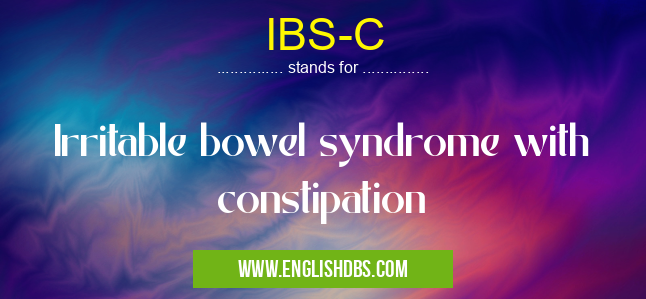What does IBS-C mean in MEDICAL PHYSICS
IBS-C stands for Irritable Bowel Syndrome with Constipation. It is a common functional bowel disorder that affects the large intestine (colon). IBS-C is characterized by abdominal pain, cramping, bloating, and difficulty passing stools.

IBS-C meaning in Medical Physics in Medical
IBS-C mostly used in an acronym Medical Physics in Category Medical that means Irritable bowel syndrome with constipation
Shorthand: IBS-C,
Full Form: Irritable bowel syndrome with constipation
For more information of "Irritable bowel syndrome with constipation", see the section below.
Symptoms of IBS-C
- Abdominal pain and cramping
- Bloating
- Constipation
- Hard, dry stools
- Straining during bowel movements
- Feeling like you haven't completely emptied your bowels
- Gas
Causes of IBS-C
The exact cause of IBS-C is unknown. However, it is thought to be related to a combination of factors, including:
- Muscle contractions in the colon: IBS-C can occur when the muscles in the colon contract too slowly or too weakly, which can slow down the passage of stool.
- Nerve sensitivity: The nerves in the colon may be more sensitive in people with IBS-C, which can cause pain and discomfort.
- Gut microbiota: The balance of bacteria in the gut may be altered in people with IBS-C, which can contribute to symptoms.
- Stress: Stress can trigger IBS-C symptoms or make them worse.
Diagnosis of IBS-C
IBS-C is diagnosed based on your symptoms and a physical exam. Your doctor may also order tests to rule out other conditions, such as:
- Colonoscopy
- Sigmoidoscopy
- Blood tests
- Stool tests
Treatment of IBS-C
There is no cure for IBS-C, but treatment can help manage symptoms. Treatment options may include:
- Lifestyle changes: Eating a healthy diet, getting regular exercise, and managing stress can help improve IBS-C symptoms.
- Medications: Medications such as laxatives, antispasmodics, and antidepressants can help relieve symptoms.
- Therapy: Cognitive behavioral therapy (CBT) can help you learn to manage stress and change your thoughts and behaviors that may be contributing to IBS-C symptoms.
Essential Questions and Answers on Irritable bowel syndrome with constipation in "MEDICAL»MEDPHY"
What exactly is IBS-C?
IBS-C is a common functional bowel disorder characterized by abdominal pain, cramping, and constipation. It is a subtype of irritable bowel syndrome (IBS), and it specifically refers to IBS with predominant constipation.
What are the symptoms of IBS-C?
The primary symptoms of IBS-C include abdominal pain, cramping, and constipation. Constipation is defined as having fewer than three bowel movements per week, and stools that are hard, dry, and difficult to pass. Other symptoms may include bloating, gas, and straining during bowel movements.
What causes IBS-C?
The exact cause of IBS-C is unknown, but it is believed to be related to a combination of factors, including changes in gut motility, sensitivity to pain, and alterations in the gut microbiome. Stress, anxiety, and certain foods may also trigger symptoms.
How is IBS-C diagnosed?
IBS-C is diagnosed based on symptoms and a physical examination. Your doctor may also order tests, such as blood tests or a colonoscopy, to rule out other conditions.
What are the treatment options for IBS-C?
Treatment for IBS-C typically involves lifestyle changes, dietary modifications, and medications. Lifestyle changes may include stress management techniques, regular exercise, and getting enough sleep. Dietary modifications may include increasing fiber intake, avoiding trigger foods, and drinking plenty of fluids. Medications may include laxatives, antispasmodics, and antidepressants.
Can IBS-C be cured?
There is no cure for IBS-C, but symptoms can be managed. With proper treatment and lifestyle changes, most people with IBS-C can live a normal life.
What are some complications of IBS-C?
While IBS-C is not life-threatening, it can have a significant impact on quality of life. Untreated IBS-C can lead to complications such as hemorrhoids, anal fissures, and fecal impaction.
Final Words: IBS-C is a common functional bowel disorder that can cause abdominal pain, cramping, bloating, and constipation. The exact cause of IBS-C is unknown, but it is thought to be related to a combination of factors. Treatment options can help manage symptoms and improve quality of life.
